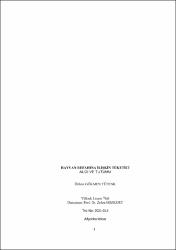| dc.contributor.advisor | Bozkurt, Zehra | |
| dc.contributor.author | Tüfenk, Özlem | |
| dc.date.accessioned | 2021-04-28T10:18:17Z | |
| dc.date.available | 2021-04-28T10:18:17Z | |
| dc.date.issued | 21.04.2021 | en_US |
| dc.date.submitted | 2021-01-28 | |
| dc.identifier.uri | https://hdl.handle.net/11630/8634 | |
| dc.description.abstract | Bu araştırmada, tüketicilerin hayvan refahına yönelik algı ve tutumunun belirlenmesi ve tüketicilerin bazı özellikleri ile hayvan refahı algı ve tutumu arasındaki ilişkilerin incelenmesi amaçlanmıştır. Araştırmanın amacı kendilerine açıklandıktan sonra kabul eden tüketicilere hayvan refahı algı ve tutum ölçekleri yüz yüze uygulanmıştır. Tüketiciler hayvanların barınma, besleme ve sağlık koşulları, verimlerin arttırılması amacıyla kullanılan yem katkıları veya yetiştirme uygulamaları ile hayvana yönelik muamelerin hayvan refahını etkilediğine ilişkin yargılara yüksek düzeyde katılım göstermiştir. Buna karşın tüketiciler hayvanların erken yaşta sütten kesilmesi, itlaf edilmesi, terk edilmesi veya kısırlaştırılmasının hayvan refahını etkilediğine ilişkin görüşlere düşük düzeyde katılım göstermiştir. Tüketicilere uygulanan hayvan refahı tutum ölçeğinin bilişsel boyutuna ilişkin elde edilen bulgulara göre tüketiciler barındırma, besleme ve sağlık şartlarının hayvanların refahını önemli ölçüde etkilediğine, buna karşın hayvanların birey olarak kabul edilmesi, ilgili yasal düzenlemeler ve sivil toplum örgütlerinin faaliyetlerinin nisbeten daha az etkili olduğuna inanmaktadırlar. Hayvan refahı tutumunun duyuşsal boyutuna ilişkin bulgulara göre tüketiciler hayvanların da insanlar gibi hakları bulunduğu, stres, ağrı ve ızdırabı hissebildikleri, hayvanlara şiddet uygulamanın vahşet olduğu ve mutlu hayvanlardan elde edilen gıdaların daha kaliteli olduğunu düşünmektedir. Ölçeğin davranışsal boyuta ilişkin sonuçlar ise tüketicilerin hayvanlara daima iyi davrandığını ve ilgili yasal düzenlemelere uyduğunu ancak hayvan refahının hayvansal ürün satın alırken tercihlerini yüksek oranda etkilemediğini göstermiştir. Tüketicilerin hayvan refahı algı ve tutumu cinsiyet ve eğitim düzeyi ile önemli derecede etkilenmiş, kadın ve gelir düzeyi yüksek olan tüketicilerin hayvan refahı algısının da daha yüksek olduğu belirlenmiştir. Yaş, medeni durum ve çocuk sahibi olma, yerleşim yerinin özelliği ve hayvan refahı bilgi düzeyinin tüketicilerin hayvan refahı algı ve tutumunu önemli düzeyde etkilemediği belirlenmiştir. Hayvan refahı algı ve tutumu yüksek olan tüketicilerin gıda etiketini inceledikleri ve yüksek hayvan refahı standartlarında üretilen gıdalara daha fazla ödeme yapmaya gönüllü oldukları anlaşılmıştır. Pet hayvanı sahibi olan tüketicilerin hayvan refahı algı ve tutumunun da daha yüksek olduğu tespit edilmiştir. Araştırmaya katılan tüketicilerin hayvan refahına yönelik algı ve tutumunun ağırlıkla yararcı bir yaklaşım içerdiği görülmüş olup, tüketicilerin hayvan refahı konu ve kavramları konusunda bilgi ve farkındalığının arttırılmasına ihtiyaç bulunduğu sonucuna varılmıştır. | en_US |
| dc.description.abstract | It was aimed to determine consumers' perception and attitude towards animal welfare and to investigate the relationships between some characteristics of the consumer and their animal welfare perceptions and attitudes. Animal welfare perception and attitude scales were applied face to face to the consumers who agree to participate after the purpose of the research have been explained to them. Consumers exhibited a high level of participation with the judgments that the animal housing, feeding and health conditions, the feed additives or breeding practices used to increase animal productivity and the handling of animals affect animal welfare. Nevertheless, there was a low agreement with the opinions that early weaning, killing, abandoning and castrating of animals impact on animal welfare. According to the findings on the cognitive dimension of the animal welfare attitude scale applied to consumers, the consumers believed that housing, feeding and health conditions significantly affected the welfare of the animals. But they did not consider that the acceptance of animals as individuals, relevant legal regulations and the activities of non-governmental organizations affected animal welfare to the same extent. Accordingly to the results on the affective dimension of animal welfare attitude, the consumers think that animals have rights like humans, they can feel stress, pain and suffering, violence against animals is cruelty and the foods obtained from happy animals are more qualified. The results from the behavioural dimension showed that consumers always treat animals well and comply with relevant statutory, but animal welfare do not significantly affect their preferences when purchasing food of animal origin. Consumers' perception and attitude on animal welfare have been significantly affected by the gender and education level, and animal welfare perception and attitudes with high-income and women were higher. It was determined that age, marital status and having children, residential area living in and animal welfare knowledge did not significantly impact on the consumers' perception and attitude towards animal welfare. It has been understood that consumers who have high animal welfare perceptions and attitudes check food labels and are willing to pay more for food produced under high animal welfare standards. The animal welfare perception and attitude of consumers who own pet animal were higher. As a result, it has determined that the perception and attitude of the consumers towards animal welfare participating in this research mainly included a utilitarian approach, and it was concluded that there is a need to increase consumer knowledge and awareness. | en_US |
| dc.language.iso | tur | en_US |
| dc.publisher | Afyon Kocatepe Üniversitesi, Sağlık Bilimleri Enstitüsü | en_US |
| dc.rights | info:eu-repo/semantics/openAccess | en_US |
| dc.subject | Tüketici | en_US |
| dc.subject | Algı | en_US |
| dc.subject | Tutum | en_US |
| dc.subject | Hayvan Refahı | en_US |
| dc.title | Hayvan refahına ilişkin tüketici algı ve tutumu | en_US |
| dc.title.alternative | Consumer perception and attitude regarding animal welfare | en_US |
| dc.type | masterThesis | en_US |
| dc.department | Sağlık Bilimleri Enstitüsü | en_US |
| dc.authorid | 0000-0002-4871-5350 | en_US |
| dc.relation.publicationcategory | Tez | en_US |



















